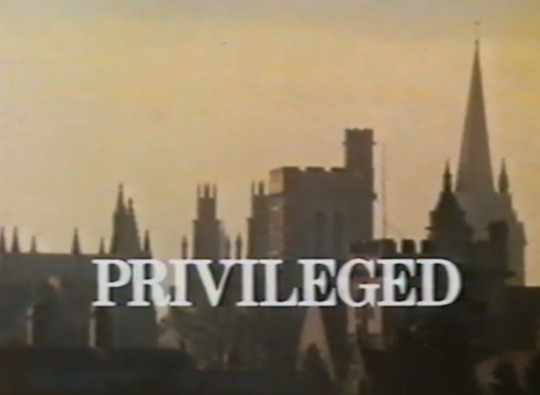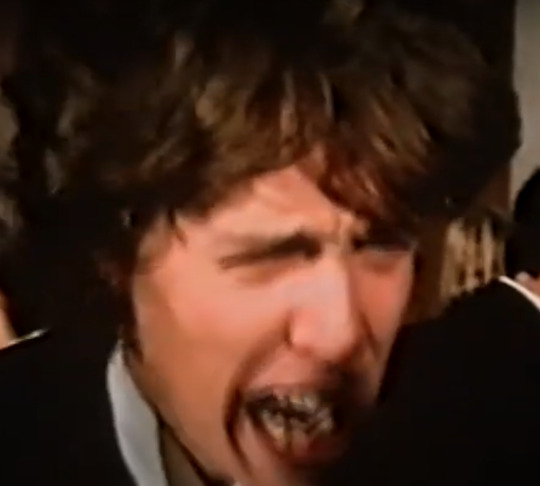#the grand gay grantathon
Explore tagged Tumblr posts
Text
GRANTATHON DAY 1: Privileged (1982) - Cloisters and Cucking

Genre: ‘Psychological Drama’
Starring: Robert Woolley, Diana Katis, HUGHIE Grant, Victoria Studd, James Wilby, Imogen Stubbs, Mark Williams
‘I demand satisfaction.’ - Lord Adrian
As films funded by the same university they are set in go, you could do a lot worse than Privileged. Our boy Mungo is credited here as little ‘Hughie Grant’, appearing in the supporting role of ‘Lord Adrian’, a legacy student who wants to get sent down from Oxford. The cast features a few noteworthy names besides Hughie: James Wilby, who we’ll be seeing again in our next film as a romantic lead alongside Grant in Merchant Ivory’s adaptation of Maurice by E.M Forster; and Imogen Stubbs, who I first saw in Frantic Assembly’s Things We Know to Be True (though I can forgive her for that).
Grant’s screen time here is limited and his character matters very little to the central plot up until the second act climax, when Adrian discovers Edward (Woolley) and Lucy’s (Studd) affair. Adrian confronts Edward at a party and hilariously challenges him to a duel, in which we get this breathtaking screengrab of Mungo:

Whoever said his earlier films didn’t showcase Hugh Grant’s range as an actor? (He did, actually)
The cinematography is very standard for low-budget films of the time, perhaps even above-average; we are treated to borderline pornographic shots of limestone structures drowned in that characteristically bleak English sunlight and the composition of much of these shots is perfectly adequate, although the quality of the picture on the copy I had when there are humans displaying a lot of emotion onscreen does sometimes result in slightly terrifying frames as above. Whenever the camera manually crash-zooms in on someone’s face in a mirror after they overhear something disconcerting, I am reminded a little of the Tales of the Unexpected series, which does befit the ‘psychological drama’ genre the film is seemingly going for. However, I would classify this more as a romantic drama, as the psychological aspects are somewhat obscured by the narrative’s indulgence in the love triangle between Edward, Anne, Lucy and Clive Durham’s special friend (portrayed by Wilby, whose character is also called 'James' -- great name).
***SPOILERS AHEAD***
With its many wide-shots of old academic buildings, play-within-a-play storyline and climactic scene of a reluctant scion turning a pistol on himself, it is very tempting to point to this work as a major influence for Peter Weir’s 1989 film Dead Poets Society, presumed zeitgeist of the ‘dark academia’ genre. But the similarities end there, to be quite frank, and I point them out only to irritate anyone reading this who thought they were clever for identifying them themselves.
I was disappointed by the lack of Mungo content overall, and especially puzzled as to Lord Adrian’s motivations in taking his own life. It’s not a student film without random suicide, I suppose, but it’s also never properly established that he is prone to self-destruction nor that he has been really backed into a corner emotionally by this point. Moreover, his death is framed with almost callous indifference by both the characters and the narrative itself. Understandable, given the cast and crew is made up of Oxford students, but dramaturgically uninteresting nonetheless as there is insufficient build-up and seemingly no fall-out. We get a few somber-ish shots of buildings (limestone is to this film as feet are to a Tarantino flick) and a line from one of the other students asking how Adrian’s cheating girlfriend is holding up, but that’s about it. The characters don’t seem to care that much that Adrian’s gone and neither does the spectator, brief as Mungo’s cameo was — that is, unless they are like yours truly, watching exclusively for Hughie and thus saddened that he was both heterosexual AND dead by the end of the film.
Even more puzzling is the loose thread of the masked attacker. At the beginning of the movie, Edward is accosted by a man in a mask; this sets up the supposed overarching mystery of the film, as a series of attacks primarily targeting women at the university continue to occur without much consequence. By the end, there is no resolution and also no reason to ponder one. A member of the main cast — Imogen (Stubbs) — is eventually attacked during a performance of The Duchess of Malfi, and there is a crumb of symbolism in how, at the very moment she is being attacked by the masked man, Edward is creeping onstage also clad in a mask to perform a scene in which the character happens to be attacking a woman. But if this is meant to say something about the covert (or, you might say, ‘masked’) violence of the upper classes, it falls dismally flat.
The hermetically sealed bacterial culture that is Oxford University is perhaps this film’s biggest hindrance. In a better script, whose title is The Riot Club, the focus would have been on the decadence and lack of empathy in the eponymously ‘Privileged’ main cast, rather than on the sexual exploits of the deeply unlikeable protagonist. Katis’ character is seemingly meant to provide an outsider perspective to the elite social circle that the ensemble occupies, but to a middle-class ruffian such as myself she seemed no less posh than the rest of them. Perhaps the scene where she is slightly disapproving of Edward when he is rude to a waitress was supposed to be this film’s equivalent to the bit in Riot Club where working-class Northerner Lauren gets to see Alistair and his mates’ true colours when she arrives at the Club’s annual dinner. But if that is the case, Anne doesn’t seem terribly deterred, and this is also quite literally the only scene in the film where we get to see actual members of the working class in the form of the waitstaff, who have a momentary exchange of commiseration about the students’ behaviour. I quite enjoyed this scene, to tell you the truth, and I wish there had been more like it.
I have visited Oxford only once in my life, but I remember enough of it to have recognised many of the locations in Privileged. As I said before, there are lots of sexy shots of limestone cloisters and grassy quads, all blanketed in the hazy glow of VHS generation loss, and I’m sure anyone who has studied or lived there will feel a great sense of nostalgia watching this film. I think perhaps my potential enjoyment of what is otherwise a fun campy time was marred both by the actual lack in Hugh Grant and my general dislike for the place. That doesn’t mean I can’t appreciate all the things this project has achieved: Mungo’s cinematic debut, Hoffman’s directorial debut, sweet Wilby sporting some serious Diana-grade golden curls, Imogen Stubbs in something where the writing doesn’t make me want to go the way of Lord Adrian, the list goes on.
Oxford students and alum will enjoy this film for the history and nostalgia. Cambridge students will enjoy this for the terrible acting. Mungo fans will enjoy this for the hair (I see now why the French kept calling him Mademoiselle). Would I recommend seeing it? If you can appreciate low-budget charm and a plot that meanders at the pace of a Teddy boy through the gates of one of the women’s colleges, you’ll find it entertaining enough. If, like Lord Adrian and I, you demand satisfaction, I’d say maybe watch it once for the novelty of seeing Hugh Grant in his first theatrical release.
OVERALL FILM RATING (/5): ⭐️⭐️; Entertaining, if a little muddled
HAIR RATING (/5): ⭐️⭐️⭐️⭐️
MUNGO FACTOR (1-10): 3 (Points given for hair and general foppishness; points deducted for the cucking and the killing him off)
See you tomorrow for my review of Merchant Ivory Productions' romantic drama Maurice.
5 notes
·
View notes